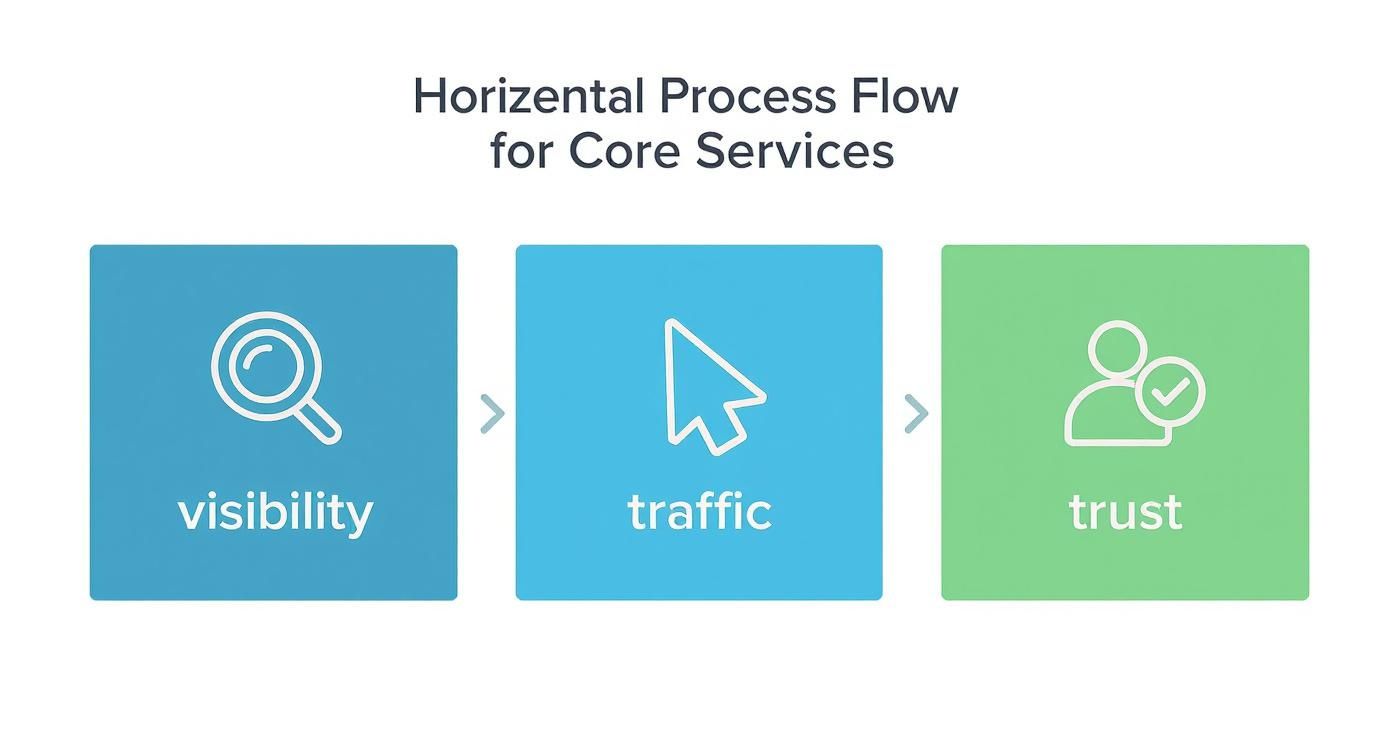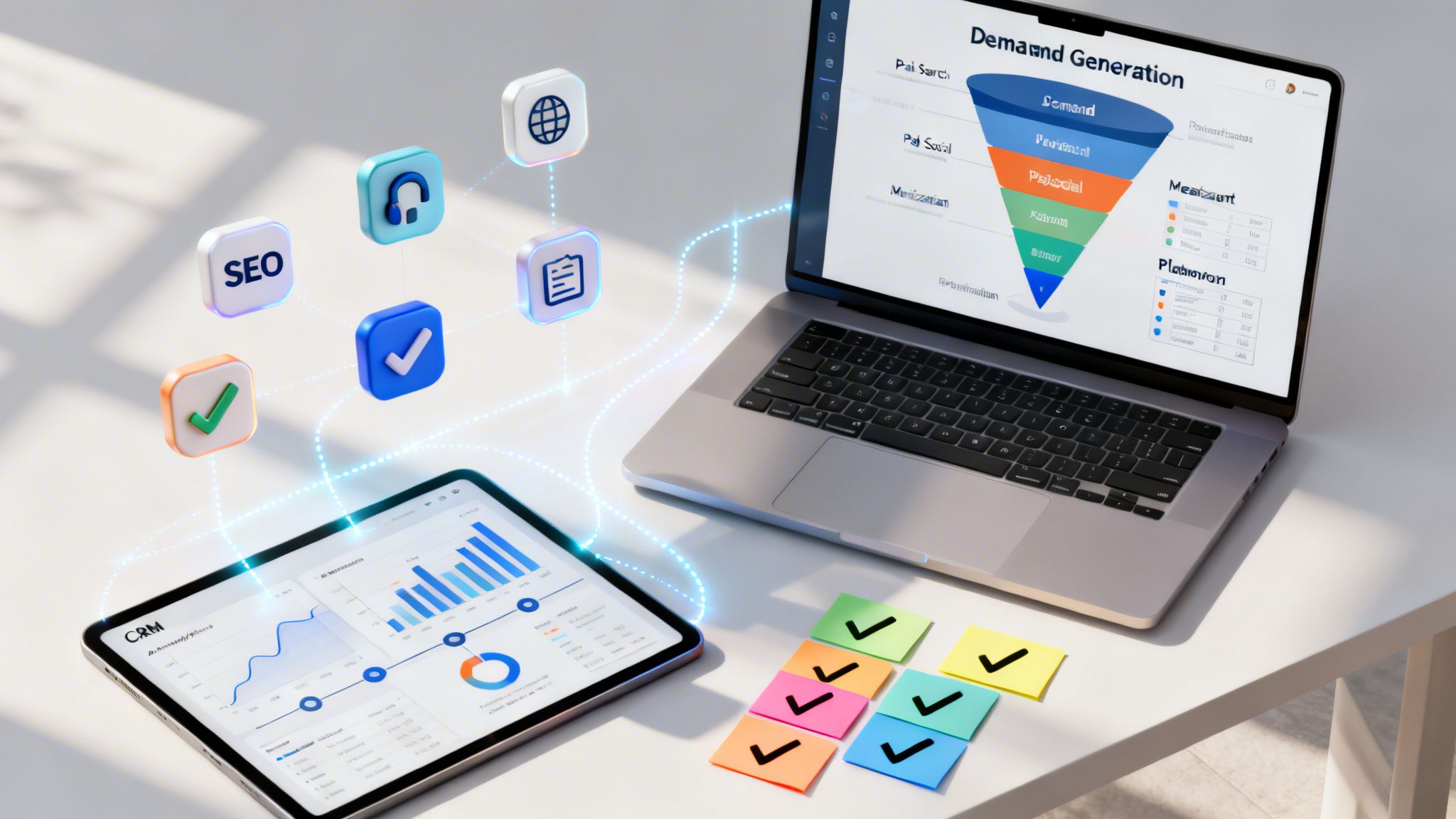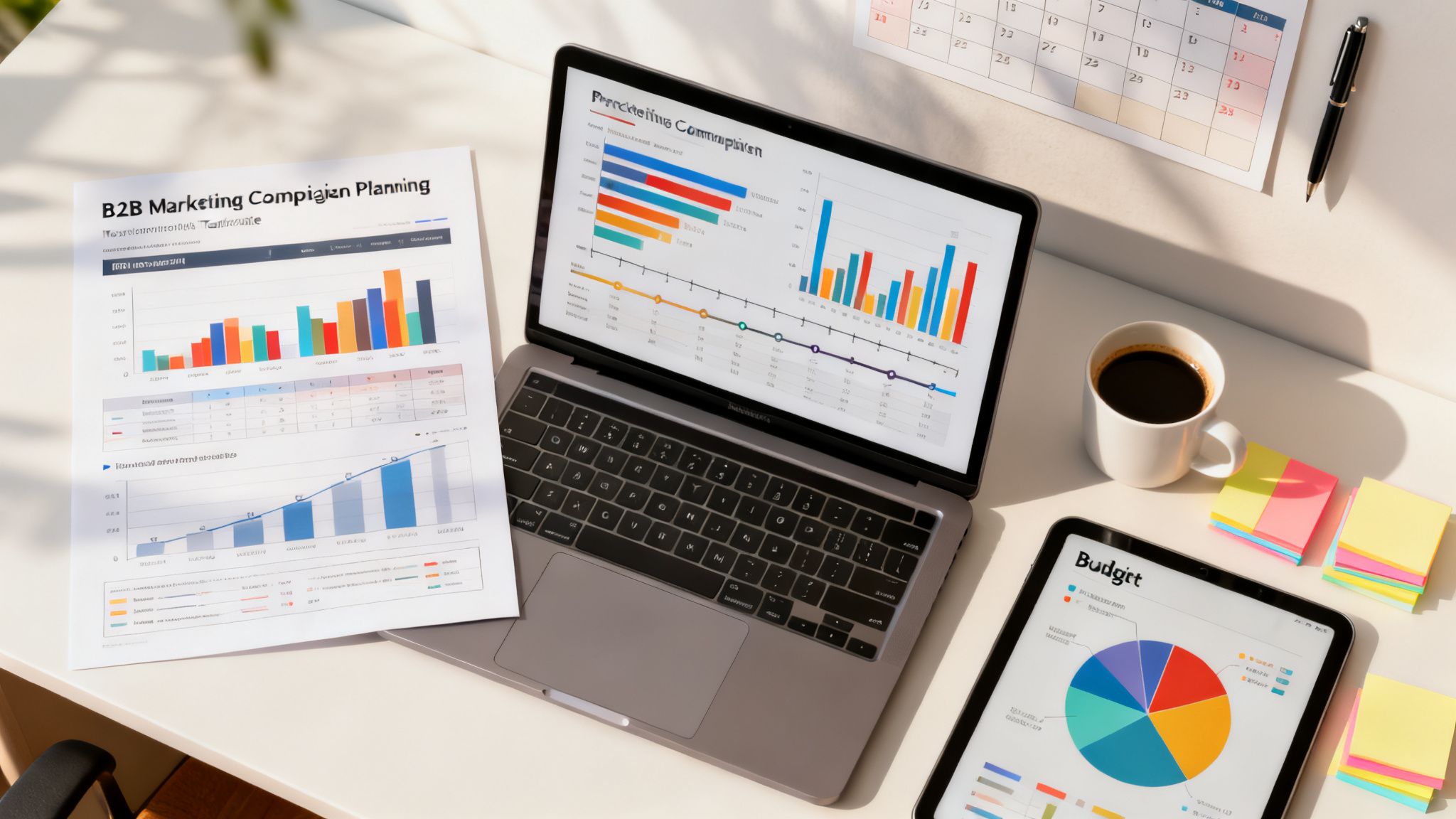Think of a digital marketing agency as a specialized extension of your own team, a strategic partner singularly focused on growing your business online. They translate complex activities like search engine optimization (SEO) and paid advertising into tangible business outcomes: more traffic, qualified leads, and sales.
In essence, an agency acts as both the architect and builder of your brand’s presence in the digital world.
Your Partner in Digital Growth

So, what does a digital marketing agency really do beyond managing a social media account or running a few ads? At its core, an agency's mission is to design and execute a data-driven strategy that connects your brand with its ideal audience. They remove the guesswork from online marketing by providing specialized expertise that most in-house teams lack the time or resources to develop.
Rather than viewing them as a vendor, it's far more effective to see them as a strategic partner. A quality agency dives deep into your business objectives, market position, and competitive landscape to build a cohesive, results-oriented plan. This collaboration is how marketing transforms from an expense into a measurable investment.
To provide a clearer picture, here’s a high-level overview of what a digital agency is structured to deliver.
A Quick Look at What a Digital Agency Delivers
This structured, methodical approach is one of the key benefits of hiring a digital agency, bringing a level of discipline and accountability that is difficult to replicate with an internal team alone.
The real value of a great agency isn't just in the tasks they perform, but in the strategic clarity they provide. They help you understand not only what to do, but why you're doing it and what results to expect.
A Thriving and Essential Industry
The growing reliance on these specialized partners is clearly reflected in the industry’s significant expansion. In the United States, the digital marketing agency market is projected to reach an impressive $58.2 billion in the coming year.
Even more telling is its compound annual growth rate of 13.6% over the last five years—a clear signal of how essential these services have become for modern businesses aiming to compete and grow. You can find more data on the digital advertising agency market growth on IBISWorld.com.
The Core Services That Drive Results
To truly understand what a digital marketing agency does, you must look at its core services—the engine that turns business goals into measurable outcomes. These are not isolated tasks on a checklist; they are interconnected tools in a strategic toolkit, each designed to solve a specific challenge, from generating initial brand awareness to fostering unshakable customer loyalty.
An agency's role is to select the right tools for your specific business needs and integrate them into a cohesive, effective strategy. While the exact services can vary, most high-performing agencies build their foundation on several key pillars that consistently deliver the results businesses need to thrive.
Let's break down these core services to see how each one contributes to the larger picture of business growth, targeting different stages of the customer journey from awareness to loyalty.
Core Digital Marketing Services and Their Business Impact
Now, let's explore what each of these services actually entails.
Search Engine Optimization (SEO): Building Long-Term Visibility
Search Engine Optimization, or SEO, is the process of optimizing your website to rank higher in search engines like Google. When your ideal customer searches for a solution to their problem, SEO is what ensures your business appears on the first page. It's not about quick tricks; it’s a long-term strategy focused on building digital authority and trust.
A proficient agency approaches SEO from multiple angles:
- Technical SEO: This is the foundation, ensuring your website's backend is clean, fast, and easily crawlable for search engines.
- On-Page SEO: This involves optimizing individual pages with relevant keywords, high-quality content, and clear meta descriptions to inform both users and search engines.
- Off-Page SEO: This focuses on building credibility through high-quality backlinks from reputable websites, which act as "votes of confidence" in Google's eyes.
The primary goal of SEO is to generate a steady, reliable stream of qualified organic traffic—people who are already searching for exactly what you offer.
Pay-Per-Click (PPC) Advertising: Capturing Immediate Demand
While SEO is a marathon, Pay-Per-Click (PPC) advertising is a sprint that delivers immediate traffic. With PPC, you bid to place ads at the top of search results or on social media feeds, paying only when someone clicks. It's a powerful way to get in front of high-intent audiences at the precise moment they are ready to make a decision.
This direct-response approach has become a central focus for agencies. According to a recent survey of over 220 agency leaders, a staggering 89% now identify PPC advertising as their core offering, surpassing even SEO and web design. This signals a major industry shift toward performance-based channels that deliver rapid, trackable returns. You can discover more insights in the 2025 Digital Agency Industry Report.
Content Marketing: Earning Trust and Authority
Content marketing is the engine that powers nearly every other digital effort. It involves creating and sharing valuable, relevant content to attract and retain a clearly defined audience. Think of it as answering your audience's questions and solving their problems before they even consider making a purchase.
A great content strategy doesn't just sell; it educates, informs, and builds a relationship. By becoming a go-to resource in your industry, you create an audience that trusts your brand and is more likely to choose you when the time is right.
An agency's content team produces assets like blog posts, in-depth case studies, whitepapers, and videos. This material is invaluable—it supports SEO by targeting keywords, provides valuable content for social media, and fuels email campaigns, all while establishing a consistent and helpful brand voice.
Social Media Marketing: Fostering Community and Engagement
Social media marketing leverages platforms like LinkedIn, Facebook, and Instagram to build your brand, engage with your audience, and drive traffic to your website. It extends far beyond posting company updates; it’s about cultivating a genuine community and fostering real conversations around your brand.
A social media team within an agency typically handles:
- Developing a content calendar aligned with business objectives.
- Engaging directly with followers to build a loyal community.
- Running highly targeted ad campaigns to reach new, relevant audiences.
- Monitoring brand mentions and sentiment to understand public perception.
Email Marketing: Nurturing Relationships for Repeat Business
Email marketing remains one of the most effective channels for nurturing leads and driving repeat business. It provides a direct line to your most engaged audience—individuals who have explicitly opted to hear from you.
Agencies use email to build automated "nurture sequences" that guide subscribers through their buyer's journey, delivering timely and relevant messages. They also manage newsletters and promotional campaigns to keep your brand top-of-mind and convert one-time buyers into loyal customers. Each of these core functions is a powerful lever for growth, and understanding these digital marketing services is the first step toward finding the right agency partner.
How Agencies Turn Strategy into Results
A brilliant marketing plan is merely a document until it is executed. This is where a high-performing agency demonstrates its true value, transforming strategic ideas into real-world results through a disciplined, repeatable process. Understanding what a digital marketing agency actually does day-to-day reveals how they build momentum and deliver predictable growth.
It all begins with a deep dive into your business. A good agency doesn't lead with tactics; they lead with questions and listen intently. This initial discovery phase is the foundation for everything that follows, ensuring every action is purposeful and directly tied to your business goals.
The Discovery and Audit Phase
Before launching any campaign, an agency must gain a crystal-clear understanding of your digital footprint. This involves a comprehensive audit of your current assets and performance metrics.
They will analyze your website's technical health, assess your search engine rankings, and evaluate the competitive landscape. This is not a cursory glance but a forensic examination to identify strengths, weaknesses, and hidden opportunities.
This phase typically includes:
- Stakeholder Interviews: Speaking with key members of your team to understand business goals, target audience pain points, and past marketing performance.
- Competitive Analysis: Identifying your main digital competitors and reverse-engineering their strategies to find exploitable gaps.
- Technical SEO Audit: Examining your website for issues like slow page speed, poor mobile experience, or crawlability errors that hinder rankings.
- Content and Social Media Review: Taking inventory of your existing content and social presence to establish a performance baseline.
With this intelligence, the agency builds a cohesive strategy—a detailed roadmap connecting specific actions to measurable business outcomes. For a concrete example, you can review a sample digital marketing strategy.
From Campaign Execution to Optimization
Once the strategy is finalized, the agency’s team of specialists begins execution. The entire operation is typically managed by an account strategist, who serves as your main point of contact and coordinates the various experts.
For instance, an SEO specialist might begin refining your website's backend, while a content writer crafts authoritative blog posts targeting key search terms. Simultaneously, a paid media expert could launch highly targeted ad campaigns to drive immediate traffic and leads.
The real magic isn't just in launching the campaign; it's in the relentless cycle of measuring, analyzing, and refining. An agency’s true value is proven by its ability to adapt based on what the data is telling them.
This infographic illustrates the fundamental process agencies use to generate results, moving from initial visibility to building lasting customer relationships.

The flow from visibility to traffic and, ultimately, to trust demonstrates that great marketing is not a one-off event but a continuous journey.
The Team Behind the Strategy
A significant advantage of what a digital marketing agency does is providing access to a diverse team of specialists—a resource most companies could not afford to hire full-time. This structure enables them to address complex challenges from multiple angles.
Your agency team will likely include several key players:
- Account Strategist/Manager: Your primary point of contact, ensuring the agency's work aligns with your business goals and the project remains on track.
- SEO Specialist: The expert dedicated to improving your organic search rankings through technical, on-page, and off-page efforts.
- Content Creator: A writer, designer, or videographer who produces the high-quality assets that fuel your campaigns.
- Paid Media Specialist: The professional managing your ad spend on platforms like Google Ads and LinkedIn to maximize return.
- Data Analyst: The individual who analyzes key performance indicators (KPIs) and uncovers insights needed for strategic adjustments.
This team-based approach ensures each component of your digital presence is managed by an expert, leading to more effective and efficient execution.
Understanding Agency Pricing Models
Choosing a digital marketing agency is a significant decision, and a major factor is cost. Understanding how agencies charge for their work is essential. There is no single answer, as the right model depends on your specific goals, the scope of work, and your comfort level with risk.
Familiarizing yourself with these pricing structures will prepare you for any conversation, enabling you to find a partner whose financial model aligns with your business objectives.
The Monthly Retainer Model
The most common structure is the monthly retainer. Think of it as a subscription to a team of marketing experts. You pay a fixed fee each month for a predefined set of services, such as ongoing SEO, content creation, and social media management.
This model is popular because it fosters a true strategic partnership. The predictable income allows the agency to dedicate a consistent team to your account, enabling them to gain a deep understanding of your business and proactively identify opportunities. For businesses seeking steady, long-term growth, a retainer offers stability and simplifies budgeting.
Key Takeaway: A monthly retainer is ideal for businesses that require a comprehensive, ongoing marketing plan. It transforms the agency from a vendor into an extension of your team, focused on delivering consistent, month-over-month results.
The key is to ensure the scope of work is clearly defined from the outset. Without a solid agreement on deliverables and success metrics, a retainer can sometimes feel like you are paying for effort rather than outcomes.
Project-Based Pricing
In contrast to the ongoing nature of a retainer, project-based pricing is for specific, one-time jobs with a clear beginning and end. This model is well-suited for tasks like a complete website redesign, a new PPC campaign launch, or the creation of a major content asset like an ebook.
The agency provides a single, flat fee for the entire project. The primary benefit is predictability; you know the total cost upfront, eliminating budget surprises.
This is an excellent choice when you have a specific need but are not ready for a long-term commitment. The main drawback is that the engagement ends once the project is complete, forgoing the continuous optimization that a retainer provides. For a deeper look into how costs relate to results, check out our guide on the cost-benefit breakdown of digital marketing services.
Performance-Based and Hybrid Models
If your business is laser-focused on achieving specific, measurable targets, performance-based pricing may be an attractive option. In this model, the agency's compensation is directly tied to hitting certain Key Performance Indicators (KPIs).
This can be structured in several ways:
- Cost Per Lead (CPL): You pay a fixed amount for each qualified lead generated by the agency.
- Revenue Share: The agency receives a percentage of the sales directly attributable to their marketing campaigns.
- Hybrid Models: A combination of a smaller base retainer plus a bonus for exceeding specific goals.
This arrangement creates powerful alignment—the agency profits only when you do. While appealing, this model is typically reserved for businesses with a well-established sales process and robust data tracking, as the agency assumes a significant portion of the financial risk.
Choosing the Right Agency for Your Business

Finding the right digital marketing agency can be a game-changer, transforming your marketing from a cost center into a powerful growth engine. Conversely, the wrong choice can lead to wasted budgets, missed opportunities, and significant frustration.
Making an informed decision requires looking beyond polished sales pitches to find a true strategic partner. This involves more than comparing service lists; it's about finding an agency whose expertise, communication style, and culture align with your business. The right partner becomes an extension of your team, genuinely invested in your success.
Evaluating Potential Partners
Your evaluation must begin with concrete evidence and industry relevance. An agency may look impressive on paper, but do they possess the specific experience required to navigate the unique challenges of your market?
Look for proof that they understand your industry. An agency with a successful track record in B2B SaaS will approach problems differently than one that primarily serves local e-commerce stores. This specialized knowledge is often the secret ingredient to a winning campaign.
Key areas to focus on include:
- Industry Expertise: Have they worked with businesses similar to yours? Request specific examples of their work in your sector.
- Relevant Case Studies: Move beyond vague testimonials. You need detailed case studies with real data, demonstrating how they solved a problem similar to yours.
- Cultural Alignment: Does their team's approach and communication style feel compatible with yours? A mismatch can create friction and hinder collaboration.
Essential Questions to Ask
Once you have a shortlist, it’s time to dig deeper. The answers to these questions will reveal what it's really like to work with them day-to-day.
Do not hesitate to press for specifics. Vague, evasive answers are a significant red flag. A transparent agency will welcome detailed questions and provide clear, honest responses. To prepare your checklist, review a solid guide on how to choose the right digital marketing agency.
Here is a practical list to get you started:
- Who will be my day-to-day contact, and what does the rest of the team look like? You need to know if you'll be working with a senior strategist or a junior account coordinator.
- How do you handle communication and reporting? Ask to see a sample report. A good report tells a story with data, focusing on business impact—not just vanity metrics like clicks and impressions.
- What is your process for strategy development and campaign optimization? They should be able to walk you through a clear, data-driven process for planning, executing, and refining their work.
- How do you measure success for a client like me? Their answer should be tied directly to your business goals—leads, sales, and ROI—not just marketing activity.
A key part of an agency's role is to manage a business's online presence, which is more critical than ever. Research shows that 97% of consumers check a company’s digital footprint before ever visiting in person. Explore more digital marketing statistics on SEO.com.
Common Red Flags to Watch Out For
Just as important as knowing what to look for is knowing what to avoid. Certain warning signs can help you steer clear of agencies more interested in closing a deal than delivering real value.
Be wary of anyone who makes grand promises without first conducting a thorough analysis of your business and data. Real marketing success is earned through strategy and diligent work, not secret formulas or shortcuts.
Keep an eye out for these common red flags:
- Unrealistic Guarantees: No reputable agency can guarantee a #1 ranking on Google or a specific number of leads in the first month. These are complex systems with too many variables.
- A "One-Size-Fits-All" Approach: If their proposed strategy sounds generic and could apply to any business, they haven’t been listening to your unique goals and challenges.
- Lack of Transparency: If they are evasive about who will be on your team, providing sample reports, or explaining their process, it’s a major concern.
- High-Pressure Sales Tactics: A true partner will provide the space and information you need to make an informed decision, not rush you into a contract.
Burning Questions You Should Be Asking a Digital Marketing Agency
Even with a solid understanding of what an agency does, a few critical questions often arise during the evaluation stage. Getting clear answers is non-negotiable for ensuring alignment on what success looks like from day one.
How Long Until We Actually See Results?
This is the big question, and the honest answer is: it depends entirely on the strategy. Some tactics are designed for immediate impact, while others are focused on building long-term, sustainable growth. A balanced approach incorporates both.
- Pay-Per-Click (PPC) Advertising: This is your sprinter. You can start generating website traffic and leads almost immediately after campaigns go live.
- Search Engine Optimization (SEO): Think of SEO as a marathon. It's a foundational strategy that typically takes four to six months to build authority and achieve meaningful gains in search rankings.
- Content and Social Media Marketing: This is about building momentum. You’ll see progress over several months as your audience grows and engagement deepens.
Any credible agency will provide a clear roadmap with realistic timelines. They should be able to identify specific short-term wins while keeping the focus on long-term growth milestones—no smoke and mirrors, just a clear plan of what to expect and when.
Should I Go with a Full-Service or a Specialized Agency?
The right choice depends on your company's immediate needs and existing in-house capabilities.
A full-service agency acts as a one-stop shop, offering a comprehensive suite of services under one roof. They create a unified strategy that connects all your digital channels, making them ideal if you're seeking a complete marketing overhaul or lack an internal team.
Conversely, a specialized (or boutique) agency brings deep, focused expertise in a specific area, such as SEO for e-commerce or PPC for SaaS companies. This is the better option if you already have a strong team but need an expert to solve a specific, complex challenge.
How Exactly Will an Agency Work with My In-House Team?
A great agency doesn't replace your team; it becomes a seamless extension of it. This partnership thrives on clear, consistent communication.
A successful agency-client relationship always involves a dedicated point of contact, regular strategy meetings, and shared project management tools. A good partner will invest real time in understanding your brand, your processes, and your goals to make sure their work amplifies what your team is already doing.
They should integrate directly with your company's objectives, empowering your internal team rather than creating friction.
What Metrics Should an Agency Actually Report On?
The Key Performance Indicators (KPIs) an agency tracks must tie directly to your most important business goals. Be wary of agencies that focus on vanity metrics that look impressive but lack substance.
For a lead generation campaign, you should focus on hard numbers like cost per lead (CPL) and conversion rates. For an e-commerce brand, the conversation should revolve around return on ad spend (ROAS) and customer acquisition cost (CAC). A reputable agency will work with you from day one to define these critical KPIs and deliver reports that tell a clear, honest story about performance.
Ready to see what a true digital marketing partner can do for your business? Twelverays crafts data-driven strategies that deliver measurable growth. Let's build a plan that achieves your most ambitious goals. Learn more about our approach at Twelverays.





